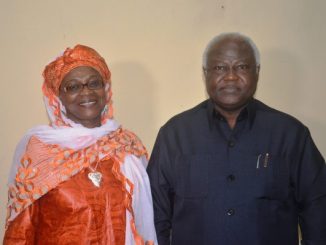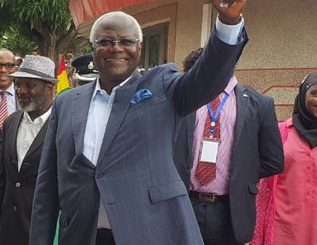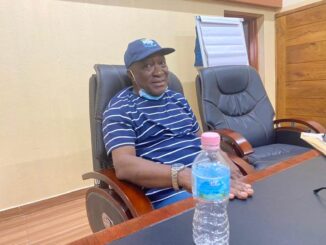
CONSORTIUM OF PROGRESSIVE POLITICAL PARTIES
(COPPP)
c/o National Grand Coalition Head Office
14 Naimbana Street,
Freetown
Tel: +23276641154/+23230748961
Or
Unity Party Head Office,
4 Pademba Road,
Freetown
Tel: +23277582363
7th May, 2021
PUBLIC NOTICE
The Consortium of Progressive Political Parties (COPPP) is a union of thirteen (13) registered political parties representing over 60% of the electorate in Sierra Leone from all regions of the country. Although the constituent political parties maintain their individual identities, COPPP provides a platform for them to pursue their primary aim and objective which is to protect democracy in Sierra Leone.

BEN KEIFALA, THE ANTI-CORRUPTION COMMISSIONER : THE COPPP WIPED THE GRIN OFF HIS FACE
COPPP has received a news item published on 4th May 2021 by the Anti-Corruption Commission (ACC) Public Relations Unit entitled “ACC COMMISSIONER RESPONDS TO POLITICAL PARTIES’ CONCERNS”. We at COPPP would like to state in no uncertain terms that this news item is a lopsided and totally distorted account of the meeting which was attended by at least ten parties in the Consortium.
Whereas the news report goes into lengthy detail about what the Commissioner, Mr. Francis Ben Keifala said, nothing is reported about the several thorny issues raised and questions asked by political parties from the floor giving the impression that the Commissioner successfully educated an ignorant group of political party leaders who went home satisfied. COPPP finds this style of reporting to be unprofessional and intended to mislead the public.
In response to our observation that the ACC, in its fight against corruption, is more focused and efficient in investigating past Government officials than current ones, Mr. Keifala delivered a laundry list of past and present cases including convictions and acquittals of Government officials, references to international recognition of the Commission’s good works, their focus on evidence and legality, and their extensive engagement with the public.
However, his inability to provide satisfactory answers onsome key issues raised left us with no other option than to conclude that the ACC finds it difficult if not impossible to handle corruption cases that involve top political officials in the current regime. Some of the highlights of the meeting are as follows:
- The Commissioner categorically stated that it is more difficult to probe public officials when they are in office because they have control over evidence. This statement alone answers our question on why the Commission seems to be better at investigating top officials in the past Government than those in the current administration.
- The Commissioner described himself as a “realist” indicating his acceptance of the status quo and that he is trying to do his best within the constraints of current realities. Unfortunately, this self-characterization appears to be a surrender to the norm and complete abdication of those high principles and ideals that are vested in his position.
- The Commissioner maintained that he does not do political bidding and claimed to be independent in the execution of his duties. However, when asked if he would prefer if the Anti-Corruption Commissioner was hired and fired not by the President but by an independent body, his reply was that it is what it is and this was the “reality” in most countries.
- On the question of the huge amounts of money paid to the Office of the First Lady, the Commissioner repeated the official explanation that those payments were legal because the Ministry of Finance is authorized by law to spend 1% of the country’s budget to a good public cause, However, the Ministry is obliged to list the organization and amount given but no such data has been forthcoming in this case of the First Lady’s pet project: “Hands off our Girls”. On this subject, so many questions remain. For instance, which proportion of the amounts paid to the First Lady was for the project and did it fall within the 1% limit? Considering the plethora of good public causes being pursued by civil society organizations, did the First Lady’s project receive preferential treatment compared to others because of her position? What is the level of oversight exercised on the spending of public funds disbursed to the Hands Off our Girls project considering that the Auditor General’s report has revealed extreme deficiencies in financial management at the Office of the First Lady?
- On the very controversial case of the missing 49,000 bags of rice donated by the Chinese Government for the Free Quality Education project, the impotence of the Commissioner in prosecuting cases involving very highly placed people came out very clearly. He explained the impediments he had to contend with such as not being able to access documentation relating to Cabinet decision on the distribution plan for the rice and the refusal of the then Attorney General to grant his request for the normal trial by judge alone as opposed to the risky option of trial by jury. This case remains unresolved and the Commissioner stated clearly that he will not take up this case again because he does not stand much of a chance to win it. The Chinese rice case therefore stands as a monument to the ACC’s inability to function independently when potential big names are involved.
- When asked whether the data given by the Africanist Press can be disputed, the Commissioner responded that they were factual but that they are technically not indicative of corruption since procedures like sole sourcing were perfectly legal.
- On the issue of “wasteful spending of public funds” the Commissioner basically avoided the subject by suggesting that money can be spent as long as the law is not broken.
In conclusion, in order to redeem its image as an impartial body that does not bend to the power of Government, the Anti-Corruption Commission needs to prove to the people that in the execution of their duties, there are no sacred cows. The litmus test will be for the ACC to find out who stole the rice from China.
Ms. Femi Claudius Cole
Interim Chairperson



